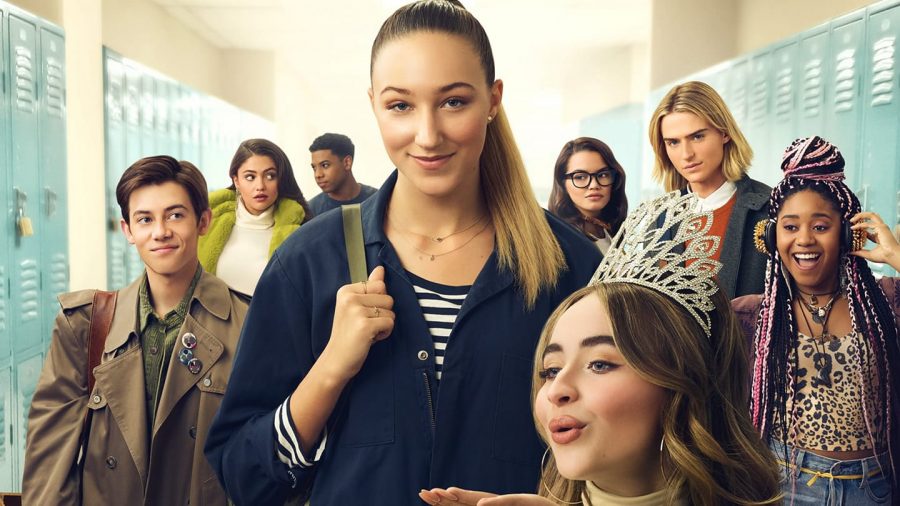“Tall Girl” Gets Adversity Wrong
Though present-day society is flooded with adversity, especially in the face of diversity, a lot of this is due to ignorance. It is crucial to educate others on issues that do not affect them personally. Not only does this acknowledge the struggles of minorities, but it offers representation to groups whose voices and experiences often go unheard and unseen.
If you had the chance to offer representation to a group of people, which group would you choose to receive acknowledgment? Would it be straight, 6’1″, fit, white, wealthy teenagers?
Well, it seems Netflix would choose them.
Netflix’s original film “Tall Girl,” released on Sept. 13, has been highly criticized for its choice of protagonist. Rather than focus on the struggles of minority groups, the movie centers on a young girl who is targeted for being taller than her peers.
The film starts with the protagonist Jodi explaining to the audience the challenges her height presents, spoken in a tone almost reprimanding to those who think they have it worse.
The issue on the table is that if there is going to be a movie about a targeted teenager in today’s society, the product must be more realistic than a white, wealthy female being bullied because she is tall and, therefore, not considered pretty. This is just not true.
People who tend to get bullied are people of color, people within the LGBTQ+ community, people with disabilities, those from poor socioeconomic backgrounds and those who do not meet the stereotypical supermodel standards of beauty.
Realistically, it is not likely that Jodi would get bullied because she is white and fits the beauty standards of a supermodel or an athlete. Jodi is tall, fit and skinny with luscious long hair. Jodi is what society has considered to be a normal teenage girl.
As a minority who was bullied as a child for getting my English and Spanish confused, not owning a phone until high school or an iPhone until college, not knowing a single thing about designer clothes, not being good at sports or math and essentially not sizing up to modern day society’s beauty standards, this movie’s choice of protagonist is all wrong.
I always saw tall, fit girls being admired and praised, while short, chubby girls were humiliated and rejected. The tall girls were never last to get picked on a team during gym class.
Being an overweight child from an immigrant and low socioeconomic background in New York City’s public school system certainly beats wearing men’s size 13 Nikes, if you ask me.
To people with experiences more fitting to the themes presented, this movie feels more like an ignorant shove to the side than a lighthearted film I’d want to watch on Netflix.
Insecurities blind us all, making us believe that we are flawed. There is no doubt that Jodi was blinded by the insults on her height, but was she so blind that she became ignorant towards everyone else’s insecurities and social struggles?
It is not right to put the spotlight on a privileged person in today’s society and have them point fingers to the rest of the world crying that everyone else has it easy. It’s not right to avoid the chance to represent people who need representation and instead use the film to make a joke about kicking a foreign exchange student out to show what America is all about.
We must be careful about how we present a picture if we’re not going to paint the whole thing. Jodi’s character development was clear by the end of the film where she experiences self-love and picks the boy she will start a romance with. However, so many other important themes in the movie were left untouched and undeveloped.
In a movie about insecurities, bullying and self-acceptance, how do you poke at immigration
and assumptions at how easy life can be for a colored person in such a comical and dismissive tone? It’s not right. It’s not fair.
It’s a great thing for all kinds of self-love and awareness stories to be told. It’s great to speak out about learning to stand tall. Simply diversify the perspectives in which these teenage acceptance stories are told. Be sure to pass the mic so that everyone’s voices are heard. And when you stand tall, just don’t get in the way of other misrepresented and suffering people who are trying to get through.
Emely Mojica, FCRH ’22, is an English major from Harlem, NY.








Tiffany Chrzanowski • Oct 9, 2019 at 10:58 pm
So proud of you Emily great article with really good perspectives👍🏽
Nazaret • Oct 4, 2019 at 10:27 pm
Wow. This just opened my mind to a different perspective on this film. I felt like something was missing, and Emily really dove deep.
Joel Urena • Oct 4, 2019 at 1:26 pm
I liked the article. I agreed with all the points.
Carlos Vasconez • Oct 4, 2019 at 11:43 am
Speak. On. It. ❤️